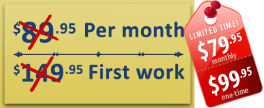Bad Money Moves
TweetWhen it comes to managing your money, there are so many variables. Budgeting, savings, investing, borrowing, etc., so many things good things you can do to make your dollar go further. There are also many bad things you can do that could truly harm your financial health. Be careful to avoid the following bad money moves.
Overextend yourself with a mortgage
A big part of the American dream is to be a homeowner. There is so much pressure to, not only own a home, but to own the biggest one you can. There are so many people adding to this pressure. When you are actually in the market, your real estate agent is going to push you towards the more expensive options to make a higher commission. Your lender adds to the pressure, since the more expensive the home, the higher the fees and interest.
They pressure you by emphasizing what you can qualify for, not what you can actually afford. We, as buyers, get stuck on that figure and our want list automatically becomes bigger. Once in that mindset, it's much more difficult coming back down to reality and go with the home and mortgage that won't make us 'house poor'. Meaning, so much of our income is tied up in our mortgage payment, we have little left over for anything else.
People who are house poor, have the tendency to borrow more money. Home owners commonly borrow against the house with a home equity loan to pay for other things that have become unaffordable. Unless income goes up, or other financial obligations change, the situation only becomes more dire.
And it's not just the mortgage payment you need to consider. There are utilities, maintenance, furnishing, decorating, possible homeowners' association fees that all need to be paid. And the bigger and more expensive the house, the more money will be consumed in these areas.
If you are thinking about buying a larger home, figure out what your new mortgage payment and all of the associated costs would be. Take that amount out of your paycheck and set it aside somewhere. If you can comfortably meet all other financial obligations for 6 months, then you are probably safe to make the move. If you struggle at all, hold off on the upgrade. And please don't justify a premature move by telling yourself that you are going to start making more money. Rarely does that happen. If anything, more unanticipated expenses pop up, giving you less than what you had planned.
Using a home equity loan to pay off credit cards
As stated above, it's common for home owners to borrow against their house to pay for other things. People have mistakenly used equity lines to pay off mounting credit card debt. They do this because, traditionally, home equity lines carry a lower interest rate than credit cards, and that interest is usually tax deductible.
Sounds like a good plan, right? It would be if people used the equity line to actually pay off their cards. Instead, the borrower starts to pay down the debt, but then gets enticed to finance more goods and services with the increased available credit. Ending up further in the hole than when he/she started. The increased credit card debt, and now, increased mortgage, will take substantially longer to pay off. And you will be paying substantially more in interest fees. And no, the tax break is no where near beneficial enough to justify this move.
Plus, an unpaid home equity line of credit could cause you to lose your home. Whereas unpaid credit cards will just hurt your credit or, worse-case scenario, get wiped out in a bankruptcy. Home equity lines should be reserved for emergencies or for things that will actually add to the value of your home, like finishing a basement or making repairs. Then pay off the debt as quickly as possible.
Borrow from your 401(k)
Not all 401(k) retirement plans come with the option to borrow against them, but the majority of plans do have that option. People who borrow against their own retirement plan do so because they have run out of other options, or feel that it's better to pay the interest rate back into their fund, rather than to another credit cards company or lender.
While this is true, there are too many risks associated with this type of borrowing. What if you lose your job or get fired? You need to repay what you borrowed, usually within a few months. If you don't have a job, how are you going to repay it? If you don't repay in the allotted time period, the loan is considered an early withdrawal which comes with heavy penalties and tax consequences.
Even if your job is secure, 401(k) funds are one of the best investment opportunities out there due to their security and growth potential. Don't be tempted to draw from them, or you'll forgo the future benefits. Leave them alone and allow them to grow to provide the safety net they are intended to when you retire. If you have a true emergency, exhaust all other options before ever turning to your 401(k).



